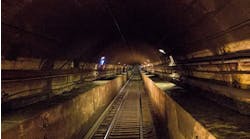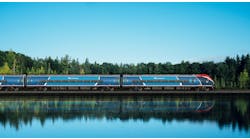TALLAHASSEE - Roused by his tea party base, Gov. Rick Scott early this year halted a decades-in-the-works bullet train linking Tampa and Orlando - citing concerns about possible costs to Florida taxpayers.
Yet a different fate awaits a commuter rail line in Central Florida that would cost state taxpayers even more.
Why is SunRail likely to go forward when high-speed rail did not?
A mix of politics, legal concerns and an opportunity to more quickly move commercial cargo, opponents and proponents of the project say.
Scott faces a Saturday deadline to decide whether to proceed with the 61.5-mile commuter train connecting downtown Orlando to neighboring counties.
Tea party activists and other SunRail opponents plan to protest the project Tuesday when the state's transportation secretary hosts public hearings on the topic with Orlando-area city and county officials.
"Gov. Scott campaigned on government accountability and not putting the taxpayers at risk. That is his mantra. And he used that when he talked about the high-speed rail deal," said Beth Dillaha, a former Winter Park city commissioner and founder of the group vetosunrail.org. "I don't know how you could then support SunRail, which has all the same issues and then some."
The governor, though, faces challenges and opportunities with SunRail he didn't with high-speed rail. And while approving it will rankle Scott's tea party base, it could also help advance parts of his agenda.
Consider:
*?SunRail is a top priority for powerful House Speaker Dean Cannon, a Winter Park Republican whose chamber proved friendly to Scott in the past legislative session.
*?State lawmakers have budgeted and spent millions of dollars on the project. No state money was budgeted for high-speed rail.
*?And the SunRail deal comes with a sweetener for Scott: $432 million in state money to move and upgrade commercial freight lines for CSX Corp., a North American freight rail operator.
It's an investment that could help Scott advance his goal of turning Florida into "the shipping capital of the East Coast, if not the nation."
In a letter sent this month to the governor, Florida Chamber of Commerce president Mark Wilson wrote: "SunRail will result directly in an increase in global trade in Florida."
One piece of that puzzle, according to a Florida Chamber Foundation report that informed Scott's decision on high-speed rail, is a state-of-the-art "intermodal" freight center for CSX in Winter Haven that's in the SunRail deal.
It's something CSX would build on its own - it built one in Ohio - but not until the economy improves, said company spokesman Gary Sease.
The center will make it easier for CSX to move freight between trains and trucks, a critical link in the movement of cargo that comes in and out of U.S. ports.
Long-term, the site could hold warehouses for big-box retailers, or a manufacturing plant, which would diversify Florida's tourism and agriculture-heavy economy.
But concerns about the large payment to CSX and a requirement that the state assume all liability for any accidents that might occur on tracks shared with CSX kept Florida lawmakers from approving SunRail in two full legislative sessions.
It finally got the green light in December 2009 during a special session called by Gov. Charlie Crist to attract federal stimulus money for high-speed rail, something that had been in the planning stages for decades.
Hungry for the bullet train money, lawmakers were told it wouldn't arrive without the state also showing a commitment to passenger rail to provide connections to the federal project. So they approved plans for SunRail, along with high-speed rail and funding for Tri-Rail, a small, struggling rail line in South Florida.
"I've been a representative for three years and that's the vote I'm most uncomfortable with," said Mike Weinstein, a Jacksonville Republican and tea party leader who voted in favor of the rail bills. "We moved so quickly on a very, very complicated and potentially costly idea. I don't think we spent enough time on it. It was a package deal. We couldn't unravel the package. It was Tri-Rail, SunRail and high-speed rail."
A little more than a year later, just one month after his inauguration, Scott rejected $2.4 billion in federal money from President Barack Obama, effectively killing the high-speed line.
Scott said he was concerned Florida taxpayers would be on the hook for cost overruns and operating losses, and would have to pay back the federal money if the project failed. Federal officials and private vendors indicated all those issues could be addressed, but Scott never put the project out to bid, saying he would rather see the money go to ports, highways and freight rail to boost Florida's international trade opportunities.
Still in play: the SunRail project many state lawmakers agreed to only as part of the high-speed rail package.
Scott started examining SunRail shortly after his inauguration, when he froze project contracts totaling $238 million as part of an executive order requiring his sign-off on any state contract worth more than $1 million.
He has until Saturday to make a decision about whether to let SunRail go forward. That's when a 60-day congressional review of a $178.6 million federal grant agreement ends.
Last week, Scott told reporters that before he responds to the FTA, he wants to make sure Central Florida residents understand their financial obligation to SunRail, and that it may mean they won't get state money for road projects.
He also said he's determining exactly what he "can and cannot do" legally given "what's already been appropriated."
Weinstein, who co-hosted Scott's budget unveiling at a tea party rally in February, said he spoke last week to the governor about SunRail.
"We are so far down the tracks on this, that the governor may be in a box. He may not have the same legal protection that he had when he stopped the high-speed rail. He may have to sign this document even though he may not want to," Weinstein said.
The high-speed rail rejection sparked a lawsuit filed in the Florida Supreme Court by two state senators. The court, facing a tight deadline for a ruling, rejected their petition, saying it didn't have enough information.
Some question, though, if Scott is getting the best legal advice on the SunRail issue. His top attorney, Charles Trippe, previously worked for CSX.
"The governor has former CSX employees working for him who might be CSX employees again in the future and it's difficult to determine where their loyalties lie," said Sen. Paula Dockery, R-Lakeland, a longtime vocal opponent of SunRail. "Once again, the special interests take precedence over the interests of the taxpayers."
Scott spokesman Brian Hughes said Trippe has recused himself from discussions of SunRail.
The Florida Department of Transportation in 2009 estimated SunRail would cost $2.6 billion over 30 years to build and operate. The latest information from the DOT puts the costs at $1.28 billion. The savings came from eliminating bond funding and calculating costs over 20 years instead of 30, said DOT spokesman Dick Kane.
State taxpayers will pay at least $585 million to build the line, and local taxpayers will contribute at least $153 million. State and local governments will split construction cost overruns. The state will cover any operating losses in the first seven years, and locals will pick up operating losses after that.
State Senate President Mike Haridopolos, a Republican who is courting the tea party in a run for the U.S. Senate, sent a letter to the governor Thursday raising questions about the terms of the grant agreement with the federal government. In particular, he questioned who would be financially responsible if one of the project partners can't meet its obligations.
But House Speaker Cannon said earlier this month that after several conversations with the governor, he is "cautiously optimistic" that Scott will approve the project.
That would be good news to Orlando-area business leaders and elected officials, who see SunRail as a job creator and a growth-management tool that will ease congestion by getting cars and freight trains off urban roads.
But it will be a demerit for Scott in the eyes of his tea party loyalists.
"The provisions given to CSX amount to corporate welfare," said Karen Jaroch, a tea party activist who met with Scott right before he killed high-speed rail. "I've not met one person in the movement that would be for SunRail. Seriously. We won't forget it."
Janet Zink can be reached at
[email protected] or (850) 224-7263.
Copyright 2008 LexisNexis, a division of Reed Elsevier Inc. All rights reserved.
Terms and Conditions | Privacy Policy

